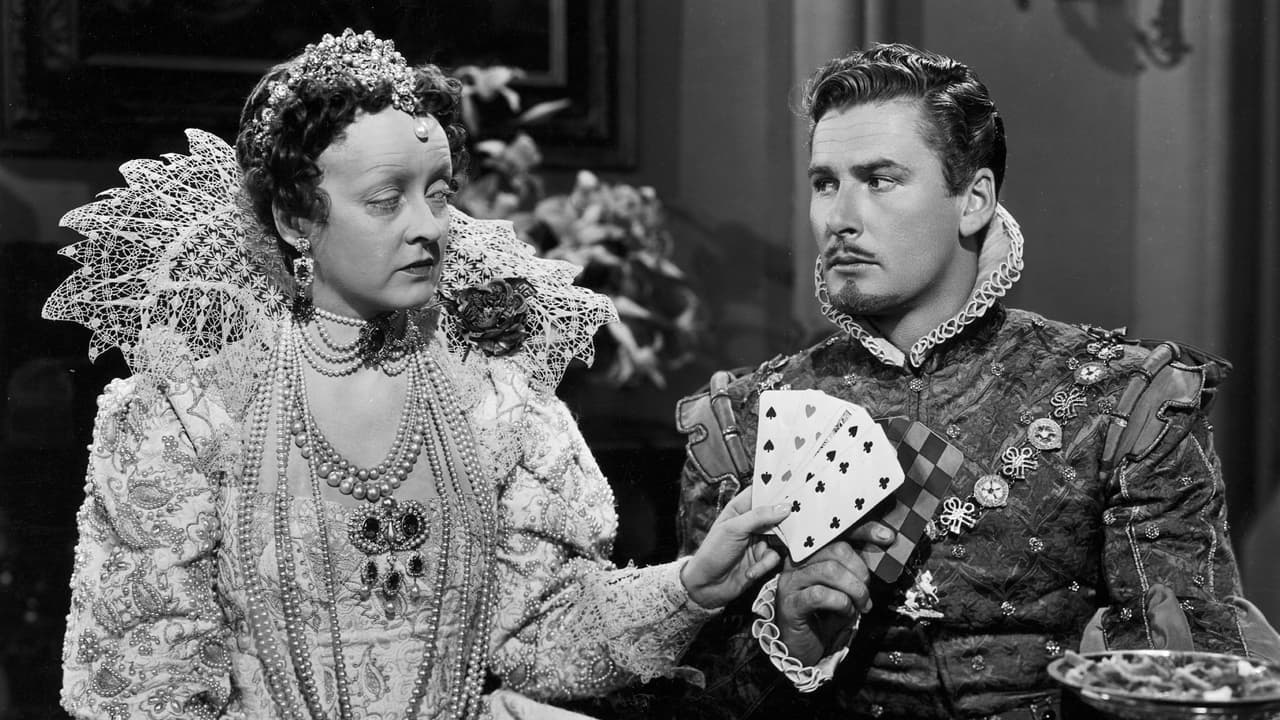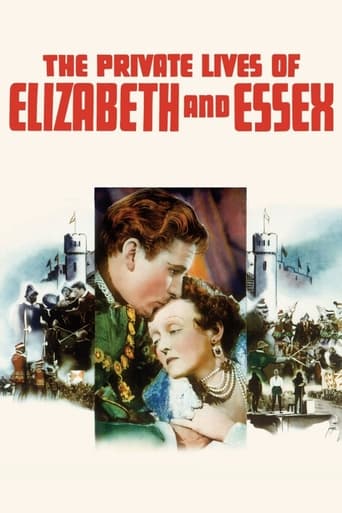Softwing
Most undeservingly overhyped movie of all time??
PlatinumRead
Just so...so bad
Lidia Draper
Great example of an old-fashioned, pure-at-heart escapist event movie that doesn't pretend to be anything that it's not and has boat loads of fun being its own ludicrous self.
Zlatica
One of the worst ways to make a cult movie is to set out to make a cult movie.
Marcin Kukuczka
Taking into account various period dramas of the 1930s and their 'interpretations' of history, PRIVATE LIVES OF ELIZABETH AND ESSEX appears to be unique at various levels. In that 'uniqueness,' it still arouses enthusiasm in film freaks. Initially titled THE KNIGHT AND THE LADY, it features for the second time a very interesting couple: Bette Davis with Errol Flynn. The former one was already associated with some best movies of the period while the latter one was at the height of popularity thanks to the still astounding portrayal of Robin Hood. Under Michael Curtiz's direction (still before his world fame with CASABLANCA), a solid period drama evokes where necessities of filmmaking transcend those of historical accuracy.Treated solely as a screen achievement and no basis for any history analysis, the film's greatest strengths lie in ACTING, MUSIC SCORE and VISUALS.ACTING: BETTE DAVIS: The dramatic resonance of the story is not achieved so well thanks to its source (a stage play by Maxwell Anderson) but, above all, thanks to the acting of great caliber by Bette Davis and her difficult (not to say doomed) collaboration with her male co-star. As Ms Davis openly loathed Mr Flynn from the very start of the production, it seems easier to have evoked contradictory emotions in her and prompt her to deliver that jungle of mixed 'make-me-love-hate-you before the camera. She both loves him and curses him, she seems to be perfectly appealing in her policy of ruling while alone and, at the same time, appears to be totally unable to exist without him. At times concentrated on the country, on England whom she calls in a purely patriotic line at the finale 'the most enduring love' of hers but, at other moments, solely focused on herself and the 'bitter aging mask' that makes her break all the mirrors in fury of not standing the sight of herself. Here, Bette Davis delivers an excellent contrast between and within a woman and a queen, the torments that truly gain sovereign control over her. That certainly affects the storytelling and a viewer. But in all that, Ms Davis manages to dominate our attention. The portrayal of the queen goes with her policy of peace which relies heavily on some other Hollywood productions of the time, including Garbo's 'interpretation' of the Swedish queen. Some lines about the nonsense of wars simply echo those ones in the 1933 MGM production (a note: Sir Laurence Olivier was going to be cast in both films....but...his leading ladies differed in the attitudes: Garbo appeared too cold in his arms while Bette Davis appeared too much after him...producers barely obeyed leading ladies' wishes). But this did not stop Bette Davis to portray a neurotic character in an excellent way.ERROL FLYNN: Because of the requirements of the drama and the inevitable focus on the queen, Robert Devereux, the Earl of Essex becomes a 'playboy' of the story who does not fully restrain the temptation of 'counting too much on queen's loves' (with reference to Lord Bacon's advice). He is hard to be tarnished by his enemies but someone who may easily eclipse the queen's popularity. In one lucid moment, he comes back triumphant from Cadiz and appears to be struck by the jungle of lies and deceit that he finds on the court. Foremost, however, he beautifully delivers torments at the queen's reaction who, actually, does not know if she hates him for making her love him or herself for needing him so much. His gentle, rather extremely subtle performance, though, does not remain 'eclipsed' by Ms Davis's totally but has its moments particularly worth attention.SUPPORTING CAST: In the role of Penelope, at the release of the film, OLIVIA DE HAVILLAND is another member of the cast who was widely popular among the audiences thanks to the fresh memory of GONE WITH THE WIND. In this rather genuine role of a queen's lady in waiting, she puts some feelings and heart to the harsh rules of the court, to the maliciousness of men in conspiracy and toughness of leaders. Above all, however, let me echo once again the aforementioned movie about Queen Christina. Doesn't the queen kissing Penelope on the lips make you think of Christina kissing Ebba? A very thought provoking parallel... Anyway, one among the supporting performers and the newcomers at the time is VINCENT PRICE in a very interesting and (unfortunately) hardly developed role of Walter Raleigh. He portrays an interesting and sophisticated character in some absorbing moments. Highly worth mentioning.MUSIC SCORE: Much of the dramatic touch of the movie is achieved thanks to Erich Korngold's score. It memorably reveals its triumphant moments, its romantic tunes and, in the most magnetizing way, the haunting flair to all. This beautifully corresponds to the emotions of the characters, to the changeable moods, to some bitter conclusions at the finale.VISUAL SPLENDOUR: Seemingly something we take for granted especially in the movies of that genre, camera-work, costumes, lights and shadows work perfectly in this film. Just a brief mention of the atmosphere of doom that is memorably prompted and evoked when drama reaches its crescendo should exemplify the enormous contribution of that aspect within the general mood of the film.Not for any greater glory of history on screen, but, undeniably, one of the most entertaining period pieces you may ever see. Despite the fact you may forget most of it after some time, it is really hard to skip in memory certain moments delivered by Bette Davis. A gem!
Laakbaar
This 1939 movie is loosely based on the story of Elizabeth and her "favourite", Robert Devereaux, the 3rd Earl of Essex. To sum up the plot in a few words (without giving away the ending): they love each other intensely, but their relationship is fraught with the complexities of their personalities and positions. Elizabeth is very much a queen, Essex a headstrong military man eyeing the throne.The actual historical events have been simplified and changed, so if you feel cheated by historical movies that stray from the facts, you might as well skip this one.I am not a fan of old movies. I have little interest in old-time stars like Bette Davis and Errol Flynn. But this was an eye-opener for me. Davis's acting and Flynn's magnetism leapt out at me, even though I was watching their performances 75 years after the fact.Bette Davis was superb. In this film she WAS Elizabeth, in almost every sense of the word. Her performance was so magnificent on so many levels, I can't even begin to go into it.And Errol Flynn. Well, the main thing about Errol Flynn in this movie is that he was really physically attractive. This movie helped me to understand the star appeal of Errol Flynn two generations ago. However, Flynn's acting here was not as strong as Davis's. He didn't really convey the overweening pride that the script called for.The sets and costumes are impressive. There is a lot of Elizabethan pageantry in the movie.This is a queen who always has on her magnificent formal clothing, jewelry and make-up. All the time, even when she's relaxing with her ladies-in-waiting in the evening or pitching woo to Essex. In this movie Elizabeth never lets her hair down. Literally. Was this a child-like movie portrayal of a queen? Or was it historically accurate? It's hard to say, but it felt unrealistic to me. I suppose you could see it as a metaphor for a woman who identified completely with her role as queen.It was a little surreal to see this ageing iconic queen (almost kabuki-like in appearance) in a passionate embrace with a young vibrant male god. In 2012 we recognise them immediately as cougar and boy toy. How shocking it must have been in 1939 to see Essex slapping the Shakespearean Elizabeth on the ass and talking to her with the rude familiarity of an Australian lover. This was 1939, however. There was only so much you could show. In this movie Elizabeth and Essex have a lot to say to each other. In those days movie fans had to be satisfied with repeated professions of love rather than actual depictions of it. Just as they had to be satisfied with the symbolic imagery of the Nine Years' War rather than anything realistic.What Elizabeth sees in Essex is plain to see. But what could Essex possibly see in Elizabeth behind all that make-up and imperial hauteur? Of course her age and make-up didn't matter to him: he was in love with her. But did he love her for her herself or for her throne? This was Elizabeth's dilemma. Essex truly loved her, but he was also ambitious. He loved her as his queen, his ageing kabuki queen. And he was a man, so he could do better on the throne than she.All Elizabeth had to do to land this stud was to give up her pride and offer him her kingdom. All Essex had to do to wed his queen was to give up his pride and be content with being her consort. Could they make it work? Who would have expected such an intriguing psychological angle in a movie from 1939. This hooked me into caring what happened. In particular, their anguish and their struggle with this predicament were realistic and palpable (in a 1939 sort of way).
edwagreen
Still another great performance was etched by Bette Davis in this film. There are mirror-like scenes where Davis looked as if she were Regina Giddons of "The Little Foxes," which would come 2 years later.The person who made Davis up and made those gowns deserved much credit. Those were certainly a noble task done extremely well.The story conveyed the idea that even great love must be sacrificed in a time of political ill-will. Our lovers allowed for politics to ultimately destroy their lives.Davis conveys an extremely nervous personality throughout the film. That constant twitching of one hand would make anyone quite nervous.Never realized that Nanette Fabray (Fabares) was around in 1939. This was probably the only dramatic film that this comedienne ever made.As usual, Olivia de Havilland, as Penelope, is totally subservient. She is almost like a Melanie Hamilton of "Gone With the Wind" fame. The latter was made the same year as this film.Whatever happened to the Vincent Price part in the film? It was as if he were swallowed up.The movie is almost like a Romeo and Juliet of politics.
evanston_dad
A talky and rather dramatically inert period drama starring Bette Davis and Errol Flynn.The sparks are apparently supposed to fly between these two big-time stars, but they instead only intermittently flicker. Davis gives a one-note performance as the woman who struggles between her duties as a queen and her love for her man -- she was such a contemporary actress that it's a shame to see her stifled behind period garb and mannerisms. Flynn is appropriately dashing as the man who loses his head over his queen, but there's not much to his role. The film was based on a stage play and it shows; the usually reliable director Michael Curtiz couldn't seem to find a way to rid the story of its staginess.The Technicolor looks great though, and fans of production and costume design may want to check the film out for those aspects alone.Grade: B-

